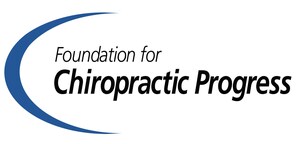SAN JOSE, Calif., May 7, 2019 /PRNewswire/ -- It's a well-known fact that pain causes sleep deprivation, but not so widely known is the fact that lack of sleep can impact pain levels. Even less known is the importance of proper sleeping posture. While good posture is important when sitting and standing, it's even more important during sleep as the muscles and ligaments of your back relax while you sleep and need to be protected. The Foundation for Chiropractic Progress, a not-for-profit organization dedicated to educating the public about the value of chiropractic care, highlights the correlation between sleep, proper sleeping posture and pain during Better Sleep Month.
Better Sleep Month, which occurs annually each May, recognizes the important role of sleep in optimizing health and wellness. Sleep deprivation is linked to higher mortality risk and lower productivity, decreasing the U.S. Gross Domestic Product by 2.28 percent, or $411 billion each year, according to Rand Corp. These findings are a concern considering one in three Americans report their sleep quality as "poor" or "only fair." There are many well-known sleep saboteurs, including improper sleeping postures, such as stomach sleeping, that can cause health problems ranging from neck and back pain to sleep apnea.
The National Sleep Foundation estimates that at least 57 percent of Americans suffer from pain that disrupts their sleep at least a few nights a week. More importantly, sleep loss has been shown to increase sensitivity to pain specifically by lowering pain thresholds.
Federal health officials have reviewed cases of dangerous, sometimes fatal, incidents tied to insomnia medications.
Roughly 100 million Americans suffer from chronic pain that interferes with their daily activities, yet, very few doctors have specialized training in pain management. Pain education for North American medical students is limited, variable and often fragmentary, according to The Journal of Pain.
Doctors of chiropractic (DC) take a natural, holistic approach to pain management by bringing the body back into alignment, recommending exercises and other activities to help patients regain their normal range of motion and flexibility, while relieving not only the pain symptoms but also correcting the issue that is causing the pain.
Chiropractic care benefits include better sleep, less dependence on sleep medications
Many Americans are seeking alternatives to insomnia medications especially since the FDA published the results of a new safety review based on recent reports of serious injuries and deaths related to prescription sleep medicines.
"Although most patients initially seek chiropractic care due to back or neck pain, many find that not only does their pain decrease and sleep improve, they also lower their stress and generally feel better and more energetic," said Sherry McAllister, DC, executive vice president of F4CP. "Chiropractic care can also help people who are trying to stop taking highly addictive sleeping pills and sedatives. Typical symptoms of withdrawal include trouble sleeping, restlessness and anxiety. In addition to chiropractic care, other behavioral, dietary and lifestyle choices need to be examined. A doctor of chiropractic can design a comprehensive care plan that supports a patient's waking and sleeping hours."
Chiropractic is a non-pharmacological care approach that focuses on one of the top causes of inadequate sleep: neuro-musculoskeletal pain. While designing a care plan to manage pain, a DC will discuss sleep habits and other lifestyle choices that could be contributing to pain or lack of mobility. DCs are required to complete undergraduate training, followed by four to five years of chiropractic college, residency and/or internship programs, and finally, national board exams, state licensure exams and continuing education — similar to other healthcare providers.
"Along with nutrition, stress management and proper posture, sleep is one of the most important factors in keeping us healthy, productive and happy," said Dr. McAllister. "All four require attention and action because they influence one another in many ways. Doctors of chiropractic can design a care plan that naturally helps people improve all these areas of their life."
About the Foundation for Chiropractic Progress
A not-for-profit organization, the Foundation for Chiropractic Progress (F4CP) informs and educates the general public about the value of chiropractic care and its role in drug-free pain management. Visit www.f4cp.org; call 866-901-F4CP (3427).
Media contact:
Marcia Rhodes, Amendola Communications for F4CP
[email protected]
480.664.8412 ext. 15
SOURCE Foundation for Chiropractic Progress

Related Links
WANT YOUR COMPANY'S NEWS FEATURED ON PRNEWSWIRE.COM?
Newsrooms &
Influencers
Digital Media
Outlets
Journalists
Opted In






Share this article